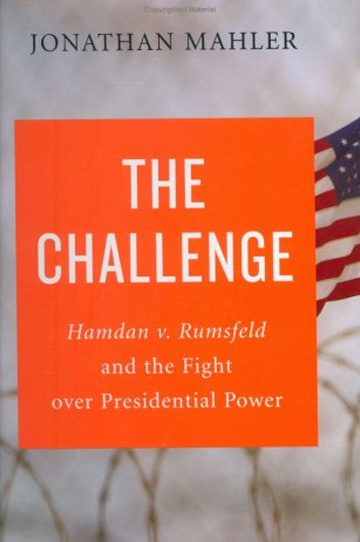
The Challenge
August 17, 2008 | San Francisco Chronicle
In the little commonwealth of books about the personal journeys behind great Supreme Court cases, “Gideon’s Trumpet” is king and lord protector. The book tells, in stirring and unabashedly majestic tones, the story of Gideon vs. Wainwright, the 1963 case in which the court unanimously announced that indigent criminal defendants have a constitutional right to a lawyer. After the decision came down, Clarence Gideon, a drifter who had been forced to defend himself against petty burglary charges, was appointed counsel, given a new trial and found not guilty.
In such a narrative, everybody wins, so to speak: The court enshrines a valuable procedural protection essential to the fairness and dignity of the legal process, and a defendant who had been deprived of that protection is determined after a fair trial to be innocent.
One recalls the ethically simple “Gideon’s Trumpet” when reading the latest great-case narrative, Jonathan Mahler’s “The Challenge: Hamdan v. Rumsfeld and the Fight Over Presidential Power.” The book leads up to the court’s second-most-recent, and its most important, Guantanamo case. In its 2006 decision, the court decided 5-3 (with Chief Justice Roberts recused) that the perfunctory military commissions President Bush established to try the Guantanamo detainees violate both the Uniform Code of Military Justice and the international law of war. The decision was a critical reaffirmation of America’s most basic principles of due process, for the commissions had allowed evidence obtained through torture and excluded detainees from their own trials. Nevertheless, telling the story of the case is a fraught business because Salim Hamdan – who was found guilty of aiding terrorism by a military jury earlier this month – freely admits that he was Osama bin Laden‘s driver and bodyguard.
That a number of readers might actually root for Hamdan – as opposed to for his right to a fair trial – while reading this book is a sad measure of Bush’s presidency. Only by capturing innocents and enemies alike, locking them up indefinitely without charge and assaulting them with tortures from Cold War China’s brainwashing playbook could the leader of the free world cultivate such cynicism and misguided zeal in so many Americans. For Hamdan does not come across as an innocent, despite Mahler’s sympathetic sketch of his wayward childhood and lack of terrorist spirit. He should have been afforded his rights under the Geneva Conventions, and he should have been tried fairly – but there ends his association with noble principles. Had Hamdan been found guilty after a legitimate trial, rather than by a military commission, which did not afford him all the rights of a civilian or military trial, we should have celebrated that he is no longer at liberty to conceal and protect Terrorist No. 1.
Still, “The Challenge” is a riveting read. Mahler, a writer for the New York Times Magazine, expertly paces the story of Hamdan’s twin fights to beat war crimes charges before his Guantanamo military commission and to prove the illegitimacy of the commission process in a federal habeas corpus lawsuit (the case that went to the Supreme Court). The book not only chronicles one of the most important cases of our time but also illuminates the various stages of the federal appellate process, from brief-writing to procedural snares – especially the clever maneuvering needed to keep Congress from stripping the Court of its jurisdiction – to the knee-knocking oral argument.
By necessity, Mahler’s story focuses less on Hamdan than on his lawyers, Lt. Cmdr. Charles Swift of the Navy, and Neal Katyal, a young law professor. In a work of narrative nonfiction, the characters are important, and Katyal, unfortunately, comes off as an arrogant workaholic with poor priorities (“To drown out the sound of his children, he listened to his iPod”). Swift is a scrapper who flew down to Guantanamo every month to visit his increasingly isolated and despairing client; Swift’s wife divorced him toward the end of the case. That such personal anguishes, like those of all “great case” litigants and attorneys, are eventually buried under broad and abstract legal principles somehow renders these sacrifices more poignant and heightens the need for their telling. So while “The Challenge” could never be a substitute for reading the court’s Hamdan opinion – which all citizens should see for themselves – it is a welcome supplement.